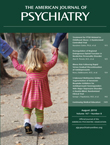Placebo Group Needed for Interpretation of Combination Trial
To the Editor: In the study conducted by Pierre Blier, M.D., Ph.D., et al. (1) and the accompanying editorial by A. John Rush, M.D., (2), it was suggested that two antidepressant medications are therapeutically more effective than single agents. This conclusion was based on research in which depressed patients were randomly assigned to one of four treatment arms: fluoxetine plus placebo, fluoxetine plus mirtazapine, bupropion plus mirtazapine, and venlafaxine plus mirtazapine. Subjects receiving two drug treatments reportedly did better than those receiving monotherapy.
The research design does not support the conclusion that combined treatment is better than mirtazapine monotherapy. There was no mirtazapine plus placebo study group. This comparison arm is necessary in order to be confident that the observed effect by the three combined treatments could not have been accomplished by mirtazapine as a single drug. The observation that mirtazapine alone was equivalent to fluoxetine or paroxetine alone in a previous study (3) does not negate the need for a control in the Blier et al. study. Without such a control, one cannot assume that two antidepressant medications are more effective than mirtazapine alone.
While there are many issues that can confound an investigation, it would have been important for the research article (1) and the accompanying editorial (2) to note this design flaw. Without such a disclaimer, conclusive evidence for these combination pharmacotherapies as being superior to mirtazapine alone is not present.
1 : Combination of antidepressant medications from treatment initiation for major depressive disorder: a double-blind randomized study. Am J Psychiatry 2010; 167:281–288 Link, Google Scholar
2 : Combining antidepressant medications: A good idea? Am J Psychiatry 2010; 167:241–243 Link, Google Scholar
3 : Mirtazapine and paroxetine in major depression: a comparison of monotherapy versus their combination. Eur Neuropsychopharmacol 2009; 19:457–465 Crossref, Medline, Google Scholar



